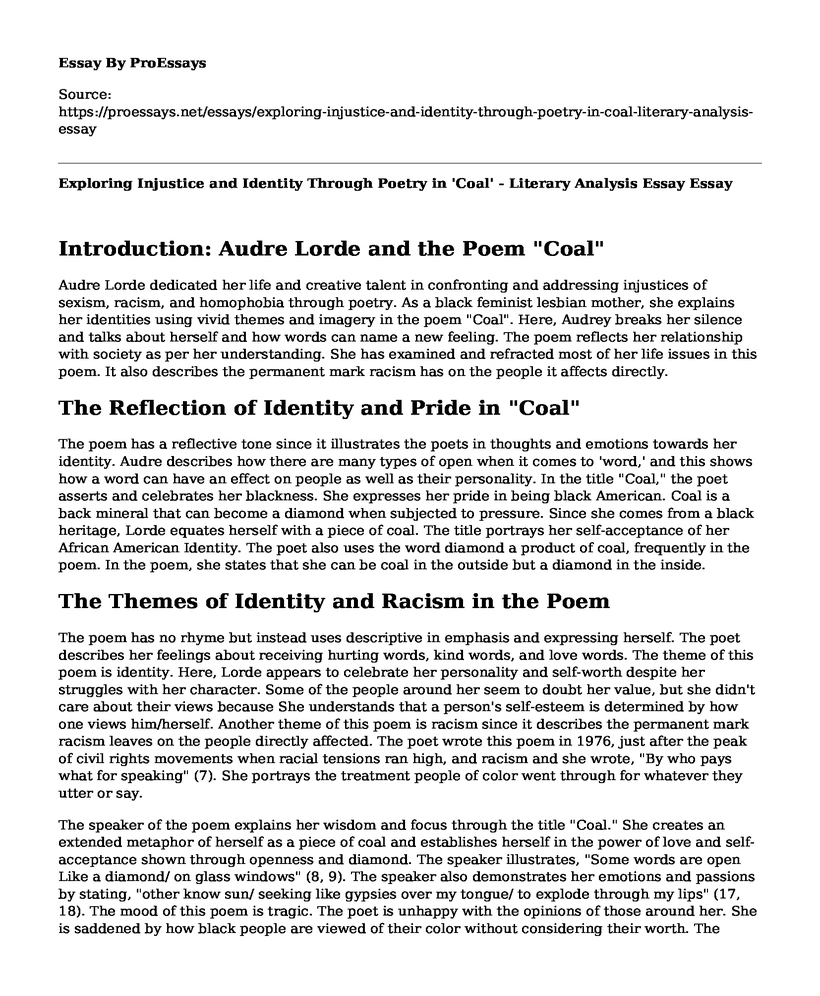Introduction: Audre Lorde and the Poem "Coal"
Audre Lorde dedicated her life and creative talent in confronting and addressing injustices of sexism, racism, and homophobia through poetry. As a black feminist lesbian mother, she explains her identities using vivid themes and imagery in the poem "Coal". Here, Audrey breaks her silence and talks about herself and how words can name a new feeling. The poem reflects her relationship with society as per her understanding. She has examined and refracted most of her life issues in this poem. It also describes the permanent mark racism has on the people it affects directly.
The Reflection of Identity and Pride in "Coal"
The poem has a reflective tone since it illustrates the poets in thoughts and emotions towards her identity. Audre describes how there are many types of open when it comes to 'word,' and this shows how a word can have an effect on people as well as their personality. In the title "Coal," the poet asserts and celebrates her blackness. She expresses her pride in being black American. Coal is a back mineral that can become a diamond when subjected to pressure. Since she comes from a black heritage, Lorde equates herself with a piece of coal. The title portrays her self-acceptance of her African American Identity. The poet also uses the word diamond a product of coal, frequently in the poem. In the poem, she states that she can be coal in the outside but a diamond in the inside.
The Themes of Identity and Racism in the Poem
The poem has no rhyme but instead uses descriptive in emphasis and expressing herself. The poet describes her feelings about receiving hurting words, kind words, and love words. The theme of this poem is identity. Here, Lorde appears to celebrate her personality and self-worth despite her struggles with her character. Some of the people around her seem to doubt her value, but she didn't care about their views because She understands that a person's self-esteem is determined by how one views him/herself. Another theme of this poem is racism since it describes the permanent mark racism leaves on the people directly affected. The poet wrote this poem in 1976, just after the peak of civil rights movements when racial tensions ran high, and racism and she wrote, "By who pays what for speaking" (7). She portrays the treatment people of color went through for whatever they utter or say.
The speaker of the poem explains her wisdom and focus through the title "Coal." She creates an extended metaphor of herself as a piece of coal and establishes herself in the power of love and self-acceptance shown through openness and diamond. The speaker illustrates, "Some words are open Like a diamond/ on glass windows" (8, 9). The speaker also demonstrates her emotions and passions by stating, "other know sun/ seeking like gypsies over my tongue/ to explode through my lips" (17, 18). The mood of this poem is tragic. The poet is unhappy with the opinions of those around her. She is saddened by how black people are viewed of their color without considering their worth. The words that were said to her had a lasting impact on her as they remained sharp, uncomfortable, and even distressing. She states, "the stub remains/an ill-pulled tooth with a ragged edge. Some words live in my throat/Breeding like adders" (14, 15, 16, 17).
Works Cited
Lorde, Audre. "Coal." The Transatlantic Review 41 (1972): 47-47.
Cite this page
Exploring Injustice and Identity Through Poetry in 'Coal' - Literary Analysis Essay. (2023, Mar 10). Retrieved from https://proessays.net/essays/exploring-injustice-and-identity-through-poetry-in-coal-literary-analysis-essay
If you are the original author of this essay and no longer wish to have it published on the ProEssays website, please click below to request its removal:
- Critical Essay Sample on 1984 by George Orwell
- History of Aesthetic Styles - Essay Example
- Annotated Bibliography Example on The Hunger Games
- Essay Example on The Character of Richard III in Shakespeare's Play
- Essay on Ozymandias: A Poem of Love, Romance and Tragic Ruins
- Essay on Judy Blume: Champion of Modern Literature & Censorship Coalition
- Essay Example on John and Mary's Happy Ending: Love, Marriage, Family, and Death







